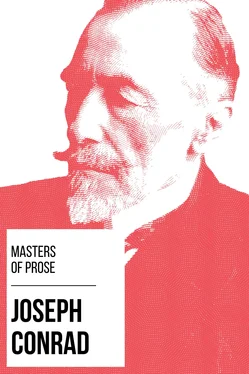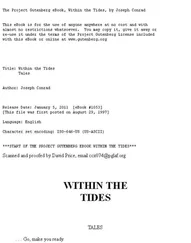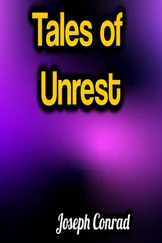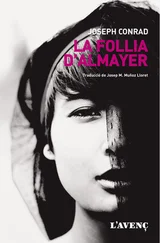1 ...7 8 9 11 12 13 ...54 It is a good forty years since I heard the tale, and the effect has not worn off yet. I believe this is the very first, say, realistic, story I heard in my life; but all the same I don't know why I should have been so frightfully impressed. Of course I know what our village dogs look like—but still. . . . No! At this very day, recalling the horror and compassion of my childhood, I ask myself whether I am right in disclosing to a cold and fastidious world that awful episode in the family history. I ask myself—is it right?—especially as the B. family had always been honourably known in a wide countryside for the delicacy of their tastes in the matter of eating and drinking. But upon the whole, and considering that this gastronomical degradation overtaking a gallant young officer lies really at the door of the Great Napoleon, I think that to cover it up by silence would be an exaggeration of literary restraint. Let the truth stand here. The responsibility rests with the Man of St. Helena in view of his deplorable levity in the conduct of the Russian campaign. It was during the memorable retreat from Moscow that Mr. Nicholas B., in company of two brother officers—as to whose morality and natural refinement I know nothing—bagged a dog on the outskirts of a village and subsequently devoured him. As far as I can remember the weapon used was a cavalry sabre, and the issue of the sporting episode was rather more of a matter of life and death than if it had been an encounter with a tiger. A picket of Cossacks was sleeping in that village lost in the depths of the great Lithuanian forest. The three sportsmen had observed them from a hiding-place making themselves very much at home among the huts just before the early winter darkness set in at four o'clock. They had observed them with disgust and, perhaps, with despair. Late in the night the rash counsels of hunger overcame the dictates of prudence. Crawling through the snow they crept up to the fence of dry branches which generally encloses a village in that part of Lithuania. What they expected to get and in what manner, and whether this expectation was worth the risk, goodness only knows.
However, these Cossack parties, in most cases wandering without an officer, were known to guard themselves badly and often not at all. In addition, the village lying at a great distance from the line of French retreat, they could not suspect the presence of stragglers from the Grand Army. The three officers had strayed away in a blizzard from the main column and had been lost for days in the woods, which explains sufficiently the terrible straits to which they were reduced. Their plan was to try and attract the attention of the peasants in that one of the huts which was nearest to the enclosure; but as they were preparing to venture into the very jaws of the lion, so to speak, a dog (it is mighty strange that there was but one), a creature quite as formidable under the circumstances as a lion, began to bark on the other side of the fence. . . .
At this stage of the narrative, which I heard many times (by request) from the lips of Captain Nicholas B.'s sister-in-law, my grandmother, I used to tremble with excitement.
The dog barked. And if he had done no more than bark, three officers of the Great Napoleon's army would have perished honourably on the points of Cossacks' lances, or perchance escaping the chase would have died decently of starvation. But before they had time to think of running away that fatal and revolting dog, being carried away by the excess of the zeal, dashed out through a gap in the fence. He dashed out and died. His head, I understand, was severed at one blow from his body. I understand also that later on, within the gloomy solitudes of the snow-laden woods, when, in a sheltering hollow, a fire had been lit by the party, the condition of the quarry was discovered to be distinctly unsatisfactory. It was not thin—on the contrary, it seemed unhealthily obese; its skin showed bare patches of an unpleasant character. However, they had not killed that dog for the sake of the pelt. He was large. . . . He was eaten. . . . The rest is silence. . . .
A silence in which a small boy shudders and says firmly:
“I could not have eaten that dog.”
And his grandmother remarks with a smile:
“Perhaps you don't know what it is to be hungry.”
I have learned something of it since. Not that I have been reduced to eat dog. I have fed on the emblematical animal, which, in the language of the volatile Gauls, is called la vache enragee; I have lived on ancient salt junk, I know the taste of shark, of trepang, of snake, of nondescript dishes containing things without a name—but of the Lithuanian village dog—never! I wish it to be distinctly understood that it is not I, but my granduncle Nicholas, of the Polish landed gentry, Chevalier de la Legion d'Honneur, etc., who in his young days, had eaten the Lithuanian dog.
I wish he had not. The childish horror of the deed clings absurdly to the grizzled man. I am perfectly helpless against it. Still, if he really had to, let us charitably remember that he had eaten him on active service, while bearing up bravely against the greatest military disaster of modern history, and, in a manner, for the sake of his country. He had eaten him to appease his hunger, no doubt, but also for the sake of an unappeasable and patriotic desire, in the glow of a great faith that lives still, and in the pursuit of a great illusion kindled like a false beacon by a great man to lead astray the effort of a brave nation.
Pro patria!
Looked at in that light, it appears a sweet and decorous meal.
And looked at in the same light, my own diet of la vache enragee appears a fatuous and extravagant form of self-indulgence; for why should I, the son of a land which such men as these have turned up with their plowshares and bedewed with their blood, undertake the pursuit of fantastic meals of salt junk and hardtack upon the wide seas? On the kindest view it seems an unanswerable question. Alas! I have the conviction that there are men of unstained rectitude who are ready to murmur scornfully the word desertion. Thus the taste of innocent adventure may be made bitter to the palate. The part of the inexplicable should be allowed for in appraising the conduct of men in a world where no explanation is final. No charge of faithlessness ought to be lightly uttered. The appearances of this perishable life are deceptive, like everything that falls under the judgment of our imperfect senses. The inner voice may remain true enough in its secret counsel. The fidelity to a special tradition may last through the events of an unrelated existence, following faithfully, too, the traced way of an inexplicable impulse.
It would take too long to explain the intimate alliance of contradictions in human nature which makes love itself wear at times the desperate shape of betrayal. And perhaps there is no possible explanation. Indulgence—as somebody said—is the most intelligent of all the virtues. I venture to think that it is one of the least common, if not the most uncommon of all. I would not imply by this that men are foolish—or even most men. Far from it. The barber and the priest, backed by the whole opinion of the village, condemned justly the conduct of the ingenious hidalgo, who, sallying forth from his native place, broke the head of the muleteer, put to death a flock of inoffensive sheep, and went through very doleful experiences in a certain stable. God forbid that an unworthy churl should escape merited censure by hanging on to the stirrup-leather of the sublime caballero. His was a very noble, a very unselfish fantasy, fit for nothing except to raise the envy of baser mortals. But there is more than one aspect to the charm of that exalted and dangerous figure. He, too, had his frailties. After reading so many romances he desired naively to escape with his very body from the intolerable reality of things. He wished to meet, eye to eye, the valorous giant Brandabarbaran, Lord of Arabia, whose armour is made of the skin of a dragon, and whose shield, strapped to his arm, is the gate of a fortified city. Oh, amiable and natural weakness! Oh, blessed simplicity of a gentle heart without guile! Who would not succumb to such a consoling temptation? Nevertheless, it was a form of self-indulgence, and the ingenious hidalgo of La Mancha was not a good citizen. The priest and the barber were not unreasonable in their strictures. Without going so far as the old King Louis-Philippe, who used to say in his exile, “The people are never in fault”—one may admit that there must be some righteousness in the assent of a whole village. Mad! Mad! He who kept in pious meditation the ritual vigil-of-arms by the well of an inn and knelt reverently to be knighted at daybreak by the fat, sly rogue of a landlord has come very near perfection. He rides forth, his head encircled by a halo—the patron saint of all lives spoiled or saved by the irresistible grace of imagination. But he was not a good citizen.
Читать дальше












